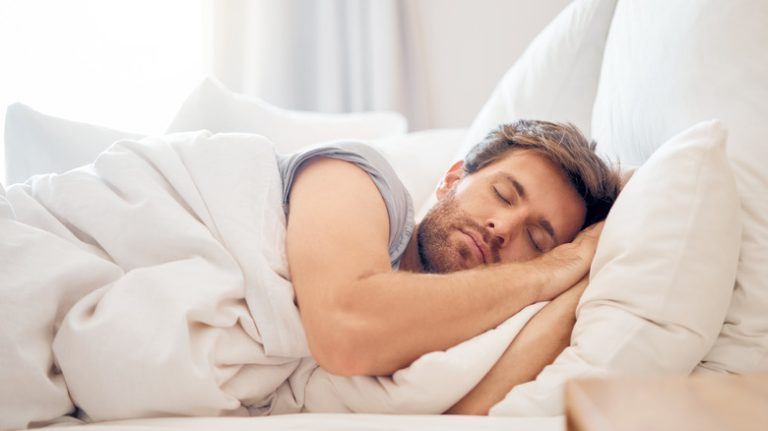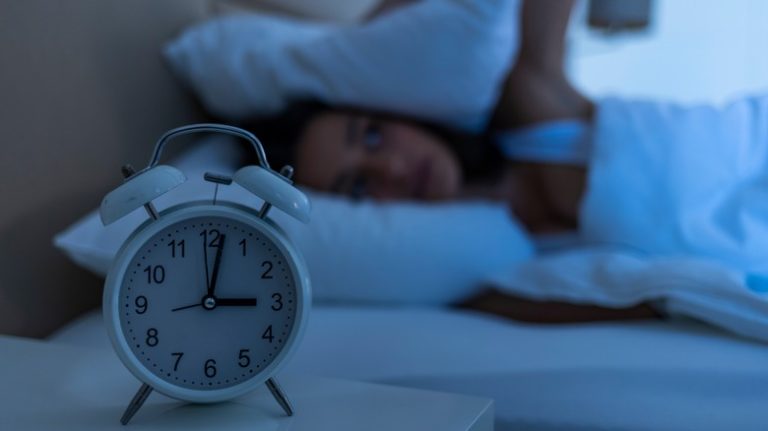According to the Sleep Foundation, anywhere from 2% to 8% of adults have nightmares. However, that number can change based on such factors as age, gender, and other circumstances. For example, a 2024 study published in Sleep Medicine Reviews showed that adult women tended to report having nightmares more than men, but that children and the elderly did not report the same difference.
There are a number of factors that can cause nightmares, according to a 2024 study published in Social Psychiatry and Psychiatric Epidemiology. These can include stress, traumatic events, worry, and mood disorders. And, as varied as the causes are, the types of nightmares can be just as varied. Research conducted by Amerisleep showed that people had terrifying dreams about waking up late, taking a test that they were not expecting or prepared for, not being able to figure out where their car was parked, and even going bald. These are some of the more common dreams that can break up your nights.
Falling
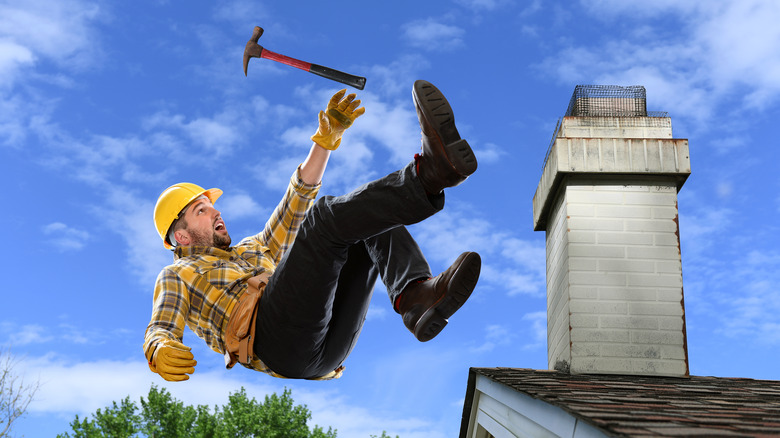
While sleeping, many of us have experienced the feeling of falling through the air, the ground rushing towards us, and waking up the second we land. These dreams are common, as evidenced by a 2024 study conducted by Motivation and Emotion, which showed that three out of five people have dreams about falling. The study also showed that falling dreams and other failure-related nightmares may be a reflection of our own feelings of helplessness and rejection by other people.
According to PsychCentral, different types of falling dreams may have different interpretations. For example, if you are suffering from nightmares about falling out of the sky, it could be a sign that you feel out of control in your own life. Dreams in which you fall through the floor or the ground gives way from under you could reflect a sudden, unexpected, or unwelcome change in your waking life. Something like losing a job or a bad breakup could potentially trigger these dreams. Looking at what is happening in your daily life and causing you stress could be a good first step in bringing your falling dreams under control.
Being chased
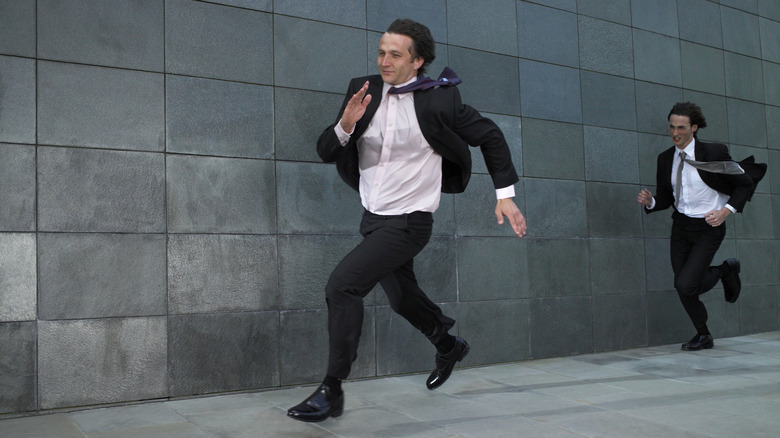
It’s a familiar dream scenario: running through the woods or the streets of the city with someone, or something, hot on our heels. During these dreams, we may even feel like our feet are rooted to the ground, rendering us unable to move. These dreams could be triggered by an unpleasant memory or something that happened to us while we were awake, such as watching a movie that scared us or having a terrifying encounter with a person or an animal. A 2024 study published in Brain Science Advances showed that events in our daily lives, such as current events, religion, and our mood, have the power to influence our dreams.
PsychMechanics reports that dreams about being chased could be an indicator of suppressed emotions. It could be a sign that we are avoiding something in our lives that we need to confront. Since running away is a survival tactic, our brains are likely filtering our problems through that mechanism, and the resultant manifestation is a nightmare about running away. Whether it’s an issue at work, financial troubles, or relationship problems, whatever we are avoiding during the day could be coming back to chase us in our sleep.
Your teeth falling out

AJR_photo/Shutterstock
This is a rather specific type of nightmare, but it is also surprisingly common. A 2024 study published in Frontiers in Psychology revealed research showing that nearly 40% of people have had dreams involving their teeth on at least one occasion. Additionally, 16% of people have had recurring nightmares about their teeth, and almost 9% said those dreams were regular. The study went on to say that there have been several attempts to interpret the meaning of dreams in which your teeth fall out. The meaning can be everything from concerns over debts to fear surrounding the death of a family member.
According to Delta Dental of Washington, dreaming about losing your teeth could be an indication of a few things, both positive and negative. On the plus side, it could be a sign of personal growth and strengthened self-esteem. As a child, losing teeth is a positive thing, a sign that you’re getting older and maturing (plus an impending payday from the Tooth Fairy). Dreaming about losing teeth could be a sign that you’re still maturing, even as an adult.
Death
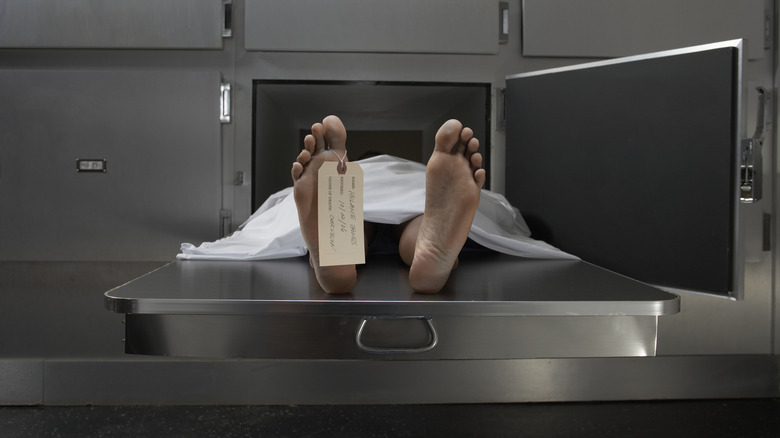
Darrin Klimek/Getty Images
Dreaming about death, either your own or the death of someone close to you, can be a profound and frightening experience. However, it is also a fairly common experience for people. A 2024 survey conducted by the American Journal of Hospice & Palliative Care showed that 58% of the people who were surveyed have had dreams about loved ones who have died.
Dreams about death can have a number of different interpretations, according to Healthline. A lot of it depends on who and what you’re dreaming about. For example, if you are dreaming about yourself dying, it could be your mind interpreting changes that are taking place around you. If you are moving or if your relationship is changing, it could represent saying goodbye to a part of your life. If you find yourself having nightmares about friends dying, you might be grappling with concerns about that person’s well-being, or it could even be a sign that the relationship is shifting and it’s time for you to move on.
Being naked in public

Robert Daly/Getty Images
Whether it’s giving a speech in your underwear or showing up at the office without apparel, we’ve all likely had dreams about being on display in some form or another. According to a 2024 study published in the International Journal of Dream Research, of the people who had dreams about being undressed in public, more than half dreamed about being fully naked. Close to 19% of people had dreams about the lower half of their body being uncovered, while only 7.5% found themselves topless in their dreams.
According to Learning Mind, the significance of being naked in your dream could be tied to how the nakedness presents itself. Dreams about public nudity and embarrassment could be a sign of insecurity or that you’re hiding something. It could also be a reflection of your low self-esteem, indicating that you need to embrace more confidence and not be afraid to be who you are. If you’re happy to be naked in your dreams, it could be a sign of confidence, self-assurance, and a healthy sex life. However you feel about being naked when you’re dreaming, it could be the difference between a pleasant dream and an actual nightmare.
Drowning
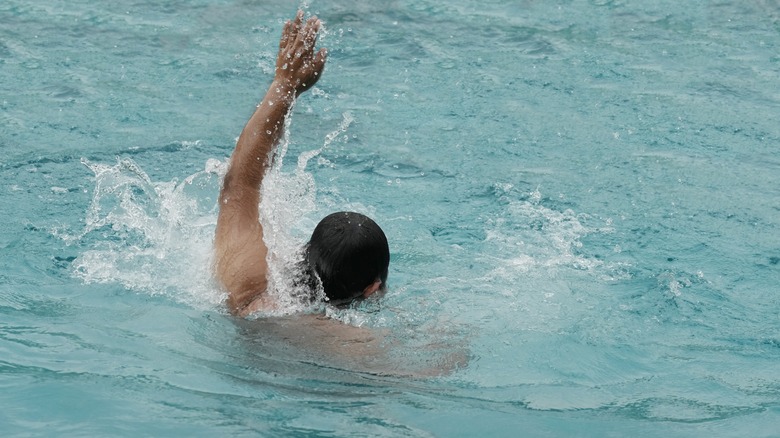
Sanit Fuangnakhon/Shutterstock
Drowning is a powerful metaphor for feeling out of control in our own lives. In real life, people who have almost drowned have reported experiencing long-term effects afterwards, including post-traumatic stress disorder, chronic respiratory issues, seizures, and brain damage (via Psychvarsity). So, with that in mind, it stands to reason that dreams about drowning can be pretty stressful.
When you dream about going underwater and not being able to surface, it could be a reflection of feeling overwhelmed in your own life, according to Dr. Diana Rangaves on 21Ninety. It could be a manifestation of the stress that you’re going through on a daily basis, ranging from bills, debt, marital woes, and family responsibilities. The dreams may also suggest some unresolved trauma or past conflict that is holding you back. However, on the positive side, dreaming about drowning could mean that you are undergoing some kind of change or rebirth.
Being attacked

Paul Bradbury/Getty Images
Dreams about trauma, aggression, or having someone attack you may stem from a feeling of vulnerability or a fear of losing control in your life (via WellBeing). You may feel like you’re metaphorically under attack from certain stressors in your life, such as neighbors who are combative, work troubles, or family woes. In more serious cases, it could be indicative of your body’s immune system trying to tell you about an impending health problem or an invading infection. Taking care of your health and practicing good sleep hygiene could all help control attacking dreams.
According to a 2024 study published in Frontiers in Psychology, emotional trauma from our waking lives can also influence our dreams. They may, in fact, be our body’s attempt to process and deal with whatever we have just gone through. The study shows that dreams can be a way for us to reframe trauma and almost take control of the situation while we’re sleeping. This theory is supported by a 2008 study published in Sleep, which examined the dreaming habits of people after the events of September 11, 2001. The study showed that, while participants did not actually dream about the terrorist attacks of 9/11, there was an increase in dreams about being attacked, with the dreamer being the victim.
Being lost
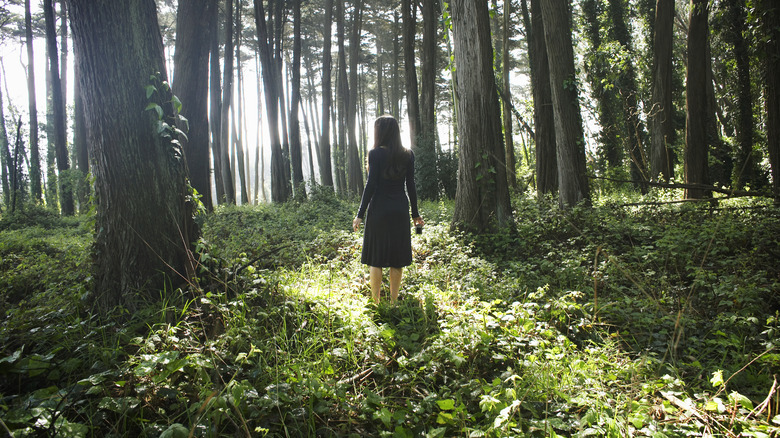
Matt Henry Gunther/Getty Images
Dreaming about not knowing where you are or trying to find your way out of a mall, the woods, or an unfamiliar city is something that happens to a decent number of people during the night. A 2024 study published in the Journal of Clinical Sleep Medicine showed that dreams about failure or helplessness, which include being lost, comprise about 17% of dreams in women and 20% of dreams in men. These dreams could stem from childhood anxiety, according to a 2024 study published in Frontiers in Psychology, which showed that adverse childhood traumas could resurface in adult dreams.
Learning Mind says that there are a number of ways to interpret dreams about being lost. These could include insecurity about a new life change, frustration with your current circumstances, and anxiety about an impending event, such as the birth of a child or an upcoming move. Dreams in which you’ve lost your way could be a way of processing feelings of not fitting, while dreaming about not being able to find your way home could mean that you are trying to make a decision that’s proving difficult.
Natural disasters
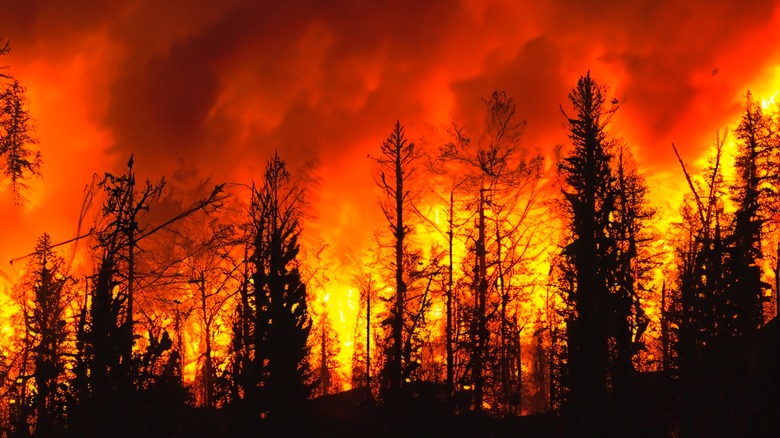
Fernando Astasio Avila/Shutterstock
Natural disasters, such as fires, hurricanes, tornadoes, and tropical storms, can cause emotional stress and trauma even when we’re awake, according to the Substance Abuse and Mental Health Services Administration. Fear of these events can trigger a wide range of emotional symptoms, including fighting with family members and, yes, distressing nightmares involving these disasters. Additionally, per Psychology Today, such external influences as climate change, wildfires, and the COVID-19 pandemic could also be rooting themselves in our subconscious, making us more anxious when we sleep.
While these dreams can be triggered by a fear of a natural disaster occurring, they can also be an indicator of emotional distress or upheaval (via Way). They can be signs that you feel out of control in your own life, or stress and anxiety related to a change in your circumstances. In some cases, these dreams may also be some kind of unconscious warning. If there are storm warnings or the fear of a potential earthquake, your subconscious mind may be helping you brace for an imminent disaster.
Being unable to move or speak

Roman Samborskyi/Shutterstock
The feeling of being completely paralyzed while we’re dreaming could be related to a condition known as sleep paralysis. According to Henry Ford Health, sleep paralysis can happen to anyone, regardless of age or physical health. It tends to happen at specific times during sleep, usually when we are in a transition phase from one stage of sleep to the next.
A 2025 study conducted by the Journal of Clinical Medicine showed that sleep paralysis is tied into the REM (Rapid Eye Movement) stage of sleep. During this phase, the body experiences what is known as muscle atonia, a form of paralysis that may keep us from acting out our dreams and harm either ourselves or anyone who may be sleeping with us. This atonia may be part of why sleep paralysis occurs. Additionally, a 2010 study published in Quality of Life Research showed that people with sleep apnea had a higher rate of sleep paralysis than those who did not. There is no one direct cause for sleep paralysis, however, according to the National Health Service, and the triggers can vary from such conditions as insomnia to post-traumatic stress disorder.
Failing at an important task

Jupiterimages/Getty Images
We’ve all likely had that dream where we’re about to take an all-important test or deliver a major presentation, only to blow it big time. Dreams of failing a test are common, especially among students. According to a 2024 study published by Consciousness and Congnition, more than 60 percent of students had dreams about a test the night before taking it. And, of those dreams, 78% were negative.
In fact, dreaming about work is something we all regularly do. According to a small-business survey conducted by Staples, more than one-third of people dream about their jobs. And, because the stress associated with test-taking is something everyone remembers (via PsychMechanics), those same dreams can reoccur as nightmares around work-related failures. As students, tests are regular challenges we have to face, and our brain takes that idea and uses it as a metaphor for other challenges we continue to face as adults.
Going bald
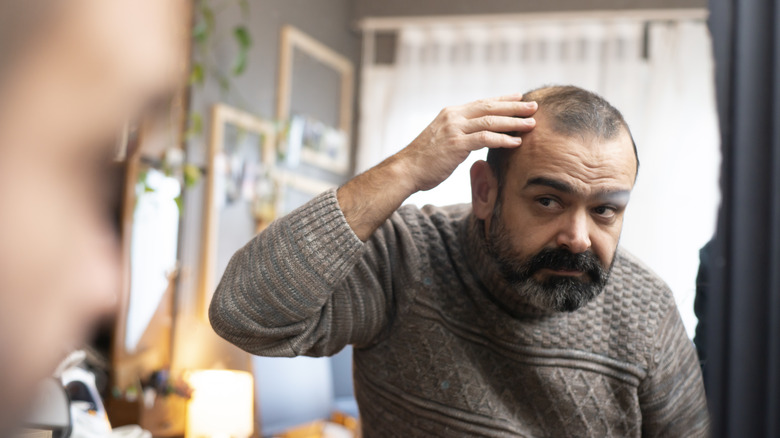
Herkisi/Getty Images
Hair loss is something that can cause a number of emotional symptoms, including depression, social anxiety, and loss of energy (via DermNet). These fears can also impact our sleeping life, according to Healthline, manifesting as dreams of our hair falling out or even discovering that we have become completely bald. However, these dreams do not have to be related to an actual concern over hair loss. They could also represent other issues that our mind is trying to process. Hair is seen as a sign of strength, beauty, and virility, and dreaming about your hair falling out could represent fears about losing those things.
There could also be a deeper psychological component to these dreams, according to Practical Psychology. If your hair loss dreams center around pulling your hair out, it could be a sign that you feel powerless in your own life. Dreams that involve you vigorously combing your hair as it comes out may be an indicator of a change in your life, shedding your old self and moving into a new phase. If you can look at how your hair loss appears in your dream, you may be able to track down the root cause — no pun intended.


